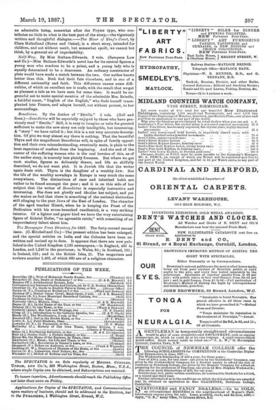Benedictus. By the Author of "Estelle." 2 vols. (Bell and
Sons.)—Benedietus will be especially enjoyed by those who have pre- viously read "Estelle." Still, it is easy to imagine or take for granted sufficient to make the new story not only intelligible, but interesting. A "story" we have called it ; but this is a not very accurate descrip- tion. Of plot we may almost say there is nothing. That the beautiful Thyra and the magnificent Benedictus will, in spite of family opposi- tion and their own misunderstanding, eventually mate, is plain to the least sagacious of readers from the beginning. And the end of the career of the suffering woman who is the real heroine of this, as of the earlier story, is scarcely less plainly foreseen. But where we get such studies, figures so delicately drawn, and life so skilfully described, we do not want plot. It is Jewish life that the writer again deals with. Thyra is the daughter of a wealthy Jew. But the life of the wealthy nowadays in Europe is very much the same everywhere. The distinctions of race and inherited habit are rather to be found amongst the poor ; and it is on this side of her subject that the writer of Benedictus is especially instructive and interesting. She does not glorify and idealise her subject, and yet she makes us feel that there is something of the national distinction still clinging to the poor Jews of the East of London. The chamber of the aged teacher Hirsch, when he is keeping the Feast of the Dedication with his seven-branched candlestick, is a very striking interior. Of a lighter and gayer kind we have the very entertaining figure of Gabriel Hofer, "an agreeable rattle," with something of an improvisatory talent about him.


































 Previous page
Previous page